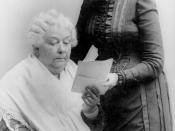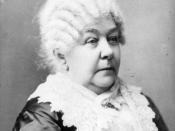History
In 1920, after 72 years of struggle, American women received the right to vote. After the 19th Amendment passed, reformers talked about female voters uniting to clean up politics, improve society, and end discrimination.
At first, male politicians moved aggressively to court the women's vote, passing legislation guaranteeing women's right to serve on juries and hold public office. Congress also passed legislation to set up a national system of women's and infant's health care clinics as well as a constitutional amendment prohibiting child labor, a measure supported by many women's groups.
But the early momentum quickly dissipated, as the women's movement divided within and faced growing hostility from without. The major issue that split feminists during the 1920s was a proposed Equal Rights Amendment to the Constitution outlawing discrimination based on sex. The issue pitted the interests of women professional against those of working class women, many of whom feared that the amendment would prohibit "protective legislation" that stipulated minimum wages and maximum hours for female workers.
The women's movement also faced mounting external opposition. During the Red Scare following World War I, the War Department issued the "Spider Web" chart, which linked feminist groups to foreign radicalism. Many feminist goals went down to defeat in the mid-1920s. Opposition from many southern states and the Catholic Church defeated the proposed constitutional amendment outlawing child labor. The Supreme Court struck down a minimum wage law for women workers, while Congress failed to fund the system of health care clinics.
Women did not win new opportunities in the workplace. Although the American work force included eight million women in 1920, more than half were black or foreign-born. Domestic service remained the largest occupation, followed by secretaries, typists, and clerks--all low-paying jobs. The American Federation of Labor (AFL) remained openly hostile to...


